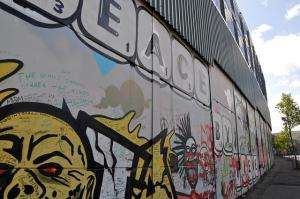The Troubles may be over but the trauma in Northern Ireland continues
As part of the World Conference on Social Work, Education and Social Development in Dublin, social workers from across the world took a field trip to Belfast to learn about the legacy of 30 years of conflict.
PSW editor Shahid Naqvi reports on the event hosted by BASW Northern Ireland.
Aged 18, John* and his brother were bundled into the boot of a car at gun point, taken to house by paramilitaries, and beaten and tortured for eight hours.
“In the middle of it I was looking through a frosted glass window at a kid playing with his mum in the living room while I was getting beaten and interrogated in the kitchen.
“There were two army patrols that passed us that night while they were doing what they were doing to us.”
John’s story is one of the many horrors of The Troubles, a 30-year period in Northern Ireland during which more than 3,600 people were killed and thousands injured. Sectarian killings and violence including kneecappings, kidnapping, torture and bombings became a normalised part of life.
According to a study in 1998 when the conflict officially ended with the Good Friday Agreement, 61 per cent of the population suffered some form of trauma as a result.
John says he initially “didn’t think much” about what happened to him. It was just part of life then in Northern Ireland. He certainly didn’t think he could get any help.
“You don’t have that thing where if something happens to you, you can go to the police. If something happens to us we can’t. You are shot dead for being a grass. If the police are seen coming to your house, the next day you are put out of the area.”
Though the conflict may have formally ended, the trauma of those who lived through it carries on.
John says: “I ended up hitting the drink and turned to drugs to cope and put it out of my head. I had severe bouts of depression, anxiety, and anger. A locum doctor told me it was post traumatic stress disorder and referred me to the Wave Trauma Centre.”
The Wave Trauma Centre was set up in Belfast in 1991 by women affected by violence and conflict in Northern Ireland. Today it provides psychological therapy and support at four sites across Northern Ireland. Last year it had 600 referrals.
Dr Ben Harper, trauma education officer at the centre, says: “The major conflict may have ended but people are still coming to terms with what has happened.
“In 2011 a study found 53 per cent of people experienced mental health problems related to The Troubles. This includes witnessing bombings, being severely injured, being physically intimidated, watching punishment beatings, seeing someone being kneecapped.
“Violence in Northern Ireland continues to be normalised. Three months ago someone was shot point blank in front of their seven-year-old daughter and it did not make the BBC news app. It is seen as par for the course. The threshold for violence is too high.”
There is also stigma associated with talking about The Troubles, says Dr Harper. Partly this is fuelled by a historic distrust of security services, he says, and partly a legacy of the fear that stopped people talking for fear of reprisals by paramilitary groups. Adding to the culture of silence, is a perceived sense that people “should just move on”, says Dr Harper.
“We are living in a modern Northern Ireland and the context of the Republic across the border which has voted for abortion and gay marriage. In this light, people sometimes view The Troubles as a backward thing that makes them feel trapped in the past.”
The years of conflict also halted the development of support services in Northern Ireland, including investment in mental health, says Dr Harper. As a result, statutory services offer little or no support for people affected by The Troubles. Dr Harper feels the current lack of functioning government since the collapse of power sharing a year-and-a-half ago adds to people’s sense being forgotten and let down.
Through grassroot work with individuals and communities, the Wave Trauma Centre aims to get people talking about Northern Ireland’s troubled past and understand their ongoing trauma. It also campaigns for those who have been physically and mentally damaged to receive pensions to support their ongoing needs.
“If you were injured in World War Two you would get a war pension,” says Dr Harper. “That would help you with lifelong care. Many of those injured were innocent bystanders of a bomb blast.”
In a land of painted murals that provide a visual reminder of the past, the conflict in Northern Ireland is still very much a “live trauma” and an “open wound”, he adds. It’s something John, who now works as a volunteer at the centre, can testify to.
“You never get over it. A sudden noise will make you jump. I don’t think I will ever feel safe because of what has happened, but I am in a better place You just learn to cope.”
*Name changed to protect identity

